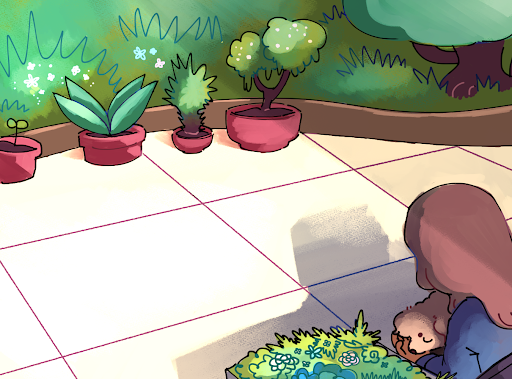Suicides Surge Amidst the Pandemic

Art/Photo by Lauryn Shin
Many students are feeling isolated from surviving months of quarantine. This has led many teens to the darkest times in their lives. To suicidal thoughts and depressive episodes. It’s hard to look on the bright side in times like these, but the end of quarantine is near. Students are using pets and the outdoors as a way to hold onto positivity.
March 5, 2021
There is an endless list of worries racing through most of our minds. Like many, Dr. Kimberly Nicolson worries about contracting and exposing others to COVID-19. She is concerned about the various speaking engagements she had planned, which were canceled this year. Thus, she feels troubled by not being able to connect with as many people as possible.
As a Redondo Beach licensed clinical social worker, Nicolson—and many mental health professionals alike— have been specifically perturbed about the increase in suicides among teenagers during this pandemic.
Life was difficult even before lockdown. To some adults, childhood can seem like the prime time to have fun and live free from the obligations of growing up. But ask any student and they’ll paint a totally different picture. Their lives consisted of hours of studying, agonizing over test scores, attending club meetings, and rushing to practice. As we progress through this pandemic, uncertainty, fear, safety, and an entirely virtual environment are being piled on top.
In a survey from late June 2020, the Centers for Disease Control and Prevention found that symptoms of anxiety and depression were increasing tremendously with young people being among the hardest-hit group. Nationally, suicide rates have risen 35 percent from 1999 to 2018. In California specifically, 2018 had an estimated 1.4 million suicide attempts and more than 48,000 deaths. This rate has increased by over 4 percent in the last year alone.
Nicolson explained how one of the largest factors is the isolation of the pandemic. While in the adolescent stage, the brain is developing at an exponential rate and it is critical for teenagers to socialize. With much of our world going virtual, it is becoming increasingly tough to reach out to others, leaving many with limited ways to make that connection. This is when the anxiety sets in. “It’s…almost like this hum that’s constantly there,” Nicolson described, “but people don’t acknowledge it, they don’t understand it. They know something feels off.” Unknowingly, these individuals may find themselves depleted and mentally exhausted. Unsurprisingly, this sudden tsunami of stressors can lead to anxiety, depression, and even suicide.
Reaching out for help is an important step in working through these devastating times and potentially preventing suicides. Fortunately, West High offers many helpful resources to students such as Wellness Week events, self-care tips, and even on-campus therapists.
Unfortunately, West’s therapist, Ms. Meghan, has noticed a hesitance in students that prevents them from reaching out for help. A staple among teenagers are mood swings that come with their rapidly changing brains and bodies. But both Ms. Meghan and Nicolson agree that this doesn’t make one’s struggles any less significant. Although many students may be going through the same type of situation, it doesn’t mean that it affects them the exact same way. “I hear that a lot… ‘it’s fine, everyone’s like this,’” Ms. Meghan shared. “Just because it’s ‘fine,’ it doesn’t mean that you can’t ask for help if you feel like you need support.”
Ms. Meghan makes sure that every student she meets with has the numbers of crisis lines, similar to those that can be found listed on the back of the student ID cards. A misconception students may have is that they must be in a state of immediate danger in order to call. Ms. Meghan revealed that “the reality is, no, if you just feel like you need help, use those lines.”
In addition to reaching out for help, there are other ways to cope. Nicolson suggests:
Pause – With a racing mind and a whirlwind of emotions, it can begin feeling like things are out of control. The first thing is to check in with yourself. A few questions to ask: How am I feeling? What’s going on? What am I thinking?
Reframe your thoughts – When you have thought one way for a long time, it can become a pattern that is hard to break. Nicolson describes this habit as a snowy mountain: For example, if you fail a test, your immediate reaction might be to be harsh on yourself. Instead, Nicolson suggested trying to find a positive that came out of it. Although the test was hard, this can help you grow and learn from your mistakes. Practicing reframing your thoughts can help it come easier to you next time.
Get yourself outside your head – It might sound easier said than done. But there are a few ways to remove yourself from a negative headspace for a while. This could mean doing something fun such as baking, coloring, playing with your dog, or spending time outside. If you are having trouble deciding on what to do, make a custom wheel to spin for a random activity to engage in for 10 minutes.
It is also important to understand that what works for one person might not work for another. Coping skills are not one size fits all. Sometimes it is helpful to narrow down what works and what doesn’t so that one is prepared when they need to cope.
No matter how big or small, there are people on campus who are ready to support anyone who needs it. As Ms. Meghan pointed out, “Even if they think it’s just a small little thing and you just want to do a 10 minute like ‘I just need to vent about something,’ or ‘Hey, there is something going on. I don’t know what to do, I need support.’ You have someone here on campus for that.”









